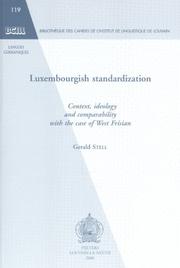| Listing 1 - 7 of 7 |
Sort by
|

ISSN: 07791666 ISBN: 9789042918474 9782877239547 9042918470 2877239543 Year: 2006 Volume: 119 Publisher: Leuven : Peeters,
Abstract | Keywords | Export | Availability | Bookmark
 Loading...
Loading...Choose an application
- Reference Manager
- EndNote
- RefWorks (Direct export to RefWorks)
Luxembourgish language --- Frisian language --- Standardization --- Grammar, Comparative --- Dialects --- Standardization. --- Luxembourgish language. --- Frisian language. --- Luxembourgish language - Standardization --- Luxembourgish language - Grammar, Comparative - Frisian language --- Frisian language - Dialects - Netherlands - West Friesland - Standardization --- Frisian language - Grammar, Comparative - Luxembourgish language
Book
ISBN: 9783631621653 3631621655 Year: 2011 Publisher: Frankfurt am Main Berlin Bern : Peter Lang,
Abstract | Keywords | Export | Availability | Bookmark
 Loading...
Loading...Choose an application
- Reference Manager
- EndNote
- RefWorks (Direct export to RefWorks)
This book discusses the linguistic reflection of ethnicity using as an illustration informal speech patterns in the bi-ethnic Afrikaans speech community. Its theoretical outlook is based on variationist studies and discourse studies on the processes shaping ethnicity. Two areas of language variation come into focus, namely Afrikaans morphosyntax and Afrikaans-English code-switching. Coloured and White speech norms are quantitatively reconstructed on the basis of a corpus of informal speech. This forms the point of departure for a qualitative reconstruction of strategies of ethnic identity negotiation. It is shown that quantifiable trends of linguistic convergence are not incompatible with enduring ethnic differentiation in speech norms.
Afrikaans language --- Code switching (Linguistics) --- Ethnicity --- Grammar. --- Code switching (Linguistics). --- Afrikaans (langue) --- Ethnicité --- Sociolinguistique --- Grammaire --- Afrique du Sud --- Ethnicité
Book
Year: 2008 Publisher: Brussel VUB
Abstract | Keywords | Export | Availability | Bookmark
 Loading...
Loading...Choose an application
- Reference Manager
- EndNote
- RefWorks (Direct export to RefWorks)
Book
Year: 2005 Publisher: Louvain-la-Neuve: UCL,
Abstract | Keywords | Export | Availability | Bookmark
 Loading...
Loading...Choose an application
- Reference Manager
- EndNote
- RefWorks (Direct export to RefWorks)
Book

ISBN: 3110346877 3110383942 9783110346879 3110343541 9783110383942 9783110343540 Year: 2015 Publisher: Berlin Boston
Abstract | Keywords | Export | Availability | Bookmark
 Loading...
Loading...Choose an application
- Reference Manager
- EndNote
- RefWorks (Direct export to RefWorks)
The study of code-switching has been carried out from linguistic, psycholinguistic, and sociolinguistic perspectives, largely in isolation from each other. This volume attempts to unite these three research strands by placing at the centre of the enquiry the role played by social factors in the occurrence, forms, and outcomes of code-switching. The contributions in this volume are divided into three parts: "code-switching between cognition and socio-pragmatics", "multilingual interaction and identity", and "code-switching and social structure". The case studies represent contact settings on five continents and feature languages with diverse linguistic affiliations. They are predictive and descriptive in their research goals and rely on experimental or naturalistic data. But they share the common goal of seeking to explain how social structures, ideologies, and identity impact on the grammatical and conversational features of code-switching and language mixing, and on the emergence of mixed languages. Given its scope, this volume is a significant addition to the empirical and theoretical foundations of the study of code-switching. It is also of relevance to the general debate on the inter-relationships between language and society.
Code switching (Linguistics) -- Social aspects. --- Multilingualism. --- Sociolinguistics -- Research. --- Structural linguistics -- Research. --- Code switching (Linguistics) --- Sociolinguistics --- Structural linguistics --- Multilingualism --- Languages & Literatures --- Philology & Linguistics --- Social aspects --- Research --- Plurilingualism --- Polyglottism --- Language and languages --- Language and society --- Society and language --- Sociology of language --- Language shift --- Switching (Linguistics) --- Sociological aspects --- Linguistics --- Language and culture --- Sociology --- Integrational linguistics (Oxford school) --- Bilingualism --- Diglossia (Linguistics) --- Code switching (Linguistics) -- Social aspects --- Sociolinguistics -- Research --- Structural linguistics -- Research --- E-books --- Social aspects. --- Research. --- Script switching (Linguistics) --- Code-switching. --- Contact Linguistics. --- Language Mixing.
Digital

ISBN: 9783110346879 9783110383942 9783110343540 Year: 2015 Publisher: Berlin ;; Boston De Gruyter
Abstract | Keywords | Export | Availability | Bookmark
 Loading...
Loading...Choose an application
- Reference Manager
- EndNote
- RefWorks (Direct export to RefWorks)
Digital

ISBN: 9783110435351 9783110433258 9783110441062 Year: 2019 Publisher: Berlin ;; Boston De Gruyter Mouton
Abstract | Keywords | Export | Availability | Bookmark
 Loading...
Loading...Choose an application
- Reference Manager
- EndNote
- RefWorks (Direct export to RefWorks)
| Listing 1 - 7 of 7 |
Sort by
|

 Search
Search Feedback
Feedback About UniCat
About UniCat  Help
Help News
News